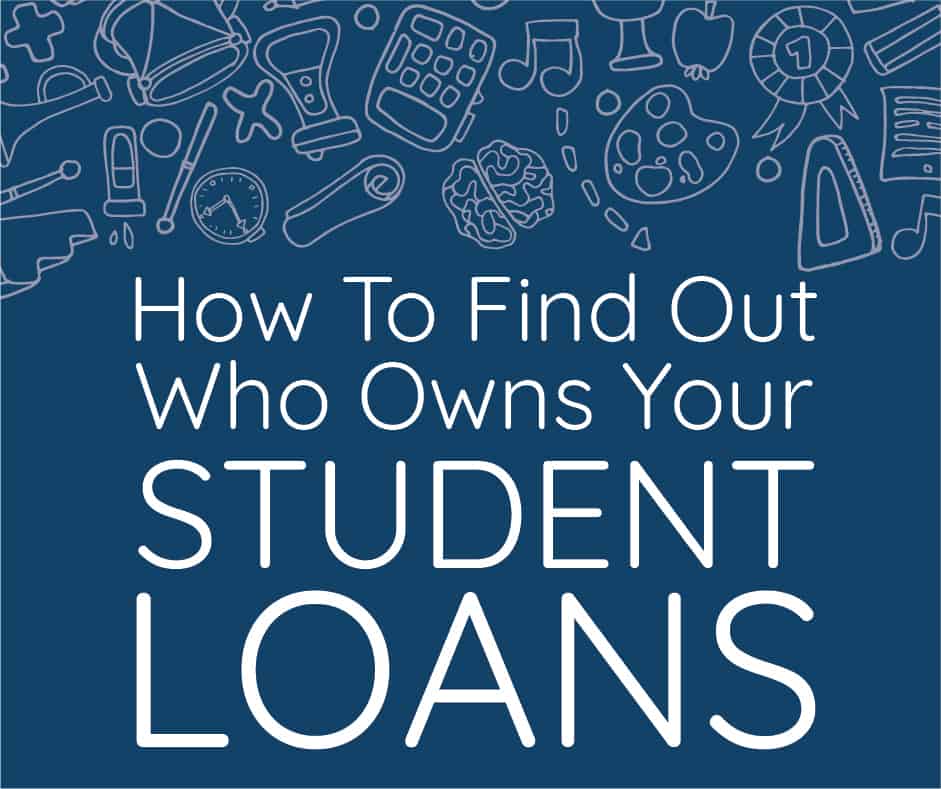
Once you graduate or resume paying your student loans after a period of forbearance, you may find that your student loan servicer has changed. Unfortunately, the task of finding and paying the proper company rests on the borrower, along with other facts you probably didn’t know about your student loans.
If you don't know where to send payment or who to contact for your student loans, you need to figure it out. If you delay, you could miss a payment and see your student loans go into default.
Borrowers need to find out who owns their student loans so they can track student loan balances and make sure the payments are applied correctly (for instance, if you make payments designated towards the principal or interest).
Who Owns Your Student Loans?
Who owns your student loans may be different than who services your student loans. The owner of the loan is the one who lent you the money, receives the interest, and controls what happens to the loan (such as pursuing collections activity). The loan servicer is the administrator that handles things like sending statements, processing payments, and handling customer service.
Federal Direct Loans: All federal direct student loans are owned by the U.S. Government. They may be serviced by loan servicers such as Aidvantage, NelNet, and MOHELA.
FFEL Loans: Federal Family Education Loans are typically commercially-owned. This means that banks and lenders own your loan. They are insured by the U.S. Government, and during the 2008 financial crisis, the Department of Education did purchase some of these loans from private banks. As such, there are a few hundred thousand directly owned by the U.S. Department of Education.
These loans are also typically serviced by the same loan servicers a federal direct loans.
Given these loans aren't owned by the government, many programs like loan forgiveness aren't applicable to them. See what you should do with your old FFEL loans here.
Perkins Loans: Perkins loans are typically owned by the college or university that made the loan. However, also during the financial crisis, some of these loans were bought and are now owned by the U.S. Department of Education. Similar to FFEL loans, these loans don't have as many options as direct loans.
Private Loans: Private loans are owned by private banks and lenders. These loans are subject to the loan terms from the lender, and are sometimes serviced directly by the bank, or sometimes they use an outside loan servicer (MOHELA is a popular choice).
What is a Student Loan Servicer?
A student loan servicer acts as an intermediary between the lender and borrower. Student loan servicers collect payments from borrowers, and also help manage student loan repayment in the event of deferment, forbearance, or other repayment options.
Despite whether you find work after you leave school, you need to identify your Federal loan servicer so that you can inform them of your situation and either make payment arrangements or make other plans to ensure that your account remains in good standing.
How To Find Who Owns Your Student Loans
Student loan servicers are assigned to both federal and private loans. The process for finding your loan servicer will be different depending on whether you have federal or private student loans. If you have both, we’ve got you covered in terms of the steps you need to take to find your student loan servicer. Below, we have the exact steps you can take to locate your student loan servicer online.
How to Find Your Federal Student Loan Servicer
Below, we have listed some of the most common student loan servicers and their phone numbers below for your convenience:
- Aidvantage: 1-800-722-1300 (Read our guide to Aidvantage here)
- CornerStone: 1-800-663-1662 (Read our guide to CornerStone here)
- FedLoan Servicing (PHEAA): 1-800-699-2908 (Read our guide to FedLoan Servicing here)
- Granite State – GSMR: 1-888-556-0022 (Read our guide to Granite State Student Loans here)
- Great Lakes Educational Loan Services: 1-800-236-4300 (Read our guide to Great Lakes here)
- HESC/Edfinancial: 1-855-337-6884 (Read our guide to Edfinancial here)
- MOHELA: 1-888-866-4352 (Read our guide to Mohela Loan Servicing here)
- Navient: 1-800-722-1300 (Read our guide to Navient here)
- Nelnet: 1-888-486-4722 (Read our guide to NelNet here)
- OSLA Servicing: 1-866-264-9762 (Read our guide to OSLA Servicing here)
If you don't know where to begin, start here.
Create Your Federal Student Aid (FSA) ID:
Recently, the Federal Student Aid ID replaced the FSA PIN, a four-digit number federal loan borrowers used to use to fill out the FAFSA and log in to other Federal Student Aid websites.
The FSA Pin was replaced with a Federal Student Aid ID in 2015, so you will want to create a new FSA ID if you haven’t logged in to a financial aid website in the last 3 years.
Not only is the FSA ID a useful tool to view your loan details, you can use it to apply for a direct consolidation loan or an income-driven repayment plan directly through the government.
Go to the Federal Student Aid FSA ID page.
- Create a new FSA ID: The site will prompt you to fill out your email address and choose a username and password, then click continue to proceed with the application after checking the box for age verification.
- Your FSA ID Must Match Your FAFSA Information: It is important to remember that your FSA ID must exactly match the information on your FAFSA. According to the Federal Student Aid site’s FAQs, common issues with failed log in attempts are often the result of confusion of FSA IDs.
- Keep Your FSA ID Confidential: It is important for you to keep your FSA ID confidential, just like a pin number for your debit card. Also, avoid sharing your FSA ID with anyone, including relatives and friends, especially if you are sharing a computer.
Get Your Account Information from the National Student Loan System
Once you get your account information and create an FSA ID, you can view your loan details on the National Student Loan Data System.
Go to StudentAid.gov and click on “Financial Aid Review.” Enter your FSA ID after you access the site and accept the site’s terms and condition. Next, you will find a page that has a chart labeled ““Aid Summary,” which will list a summary of your loans, including the type of loan, loan disbursal date, and amount due.
You will be able to access more information about each of your loans when you click on the boxes to the left of the “Type of Loan” column. At the bottom of the page, you will see a chart labeled “Servicer/Lender/Guaranty Agency/ED Servicer Information.” To the right, you will find the “Current ED servicer”, which is your student loan servicer.
Once you have gone through these steps, you will then have to sign up directly with your federal loan servicer to make payments. You can also pay your bill by check, mailing your payment directly to your loan servicer. There are several benefits to signing up for automatic payments from your bank account- you will never miss a payment, so long as there are sufficient funds in your account, but aside from that, there are monetary benefits to automatic payments. You may be eligible for a small interest rate reduction if you decide to pay via direct debit.
Once you are registered, you can connect your bank information and make payments directly from your bank account. You can send checks as well, but in my opinion, it’s much easier to do it online.
Typically, you can get a 0.25% interest rate deduction by signing up for automatic payments. If you’re not interested in auto pay, find out if you can sign up for online alerts to be reminded when a payment is due.
If Your Loans Are In Collections
If your student loans are in defaults and in collections, you need to contact the student loan debt collector servicing your loans. Here's the complete list of debt collectors for student loan debt.
Furthermore, you need to take steps to get your student loans out of default through a process called student loan rehabilitation.
How To Find Your Private Student Loan Servicer
If you have private student loans, the process may not be as straightforward, and it may take a bit more work to locate your student loan servicer.
The best way to find your private student loan servicer is to pull up your credit report. You can check your credit report for free at annualcreditreport.com. You can also use a free tool like Credit Karma to monitor your credit and get help.
Once you see your credit report, you can see all your lenders listed. You will also be able to get contact information for these companies, along with your loan balance, account number, and more. With this information, you can start tracking down your student loans.
Where To Get Professional Help For Your Student Loans
It sounds like it could be confusing, but it doesn’t have to be. You can do most things yourself on StudentLoans.gov. You can also call your lender to get started.
If you're not quite sure where to start or what to do, consider hiring a CFA to help you with your student loans. We recommend The Student Loan Planner to help you put together a solid financial plan for your student loan debt. Check out The Student Loan Planner here.
What are some of the biggest issues you have had with your student loan servicer? Tell us in the comments section below.

Robert Farrington is America’s Millennial Money Expert® and America’s Student Loan Debt Expert™, and the founder of The College Investor, a personal finance site dedicated to helping millennials escape student loan debt to start investing and building wealth for the future. You can learn more about him on the About Page or on his personal site RobertFarrington.com.
He regularly writes about investing, student loan debt, and general personal finance topics geared toward anyone wanting to earn more, get out of debt, and start building wealth for the future.
He has been quoted in major publications, including the New York Times, Wall Street Journal, Washington Post, ABC, NBC, Today, and more. He is also a regular contributor to Forbes.
Editor: Clint Proctor Reviewed by: Chris Muller
